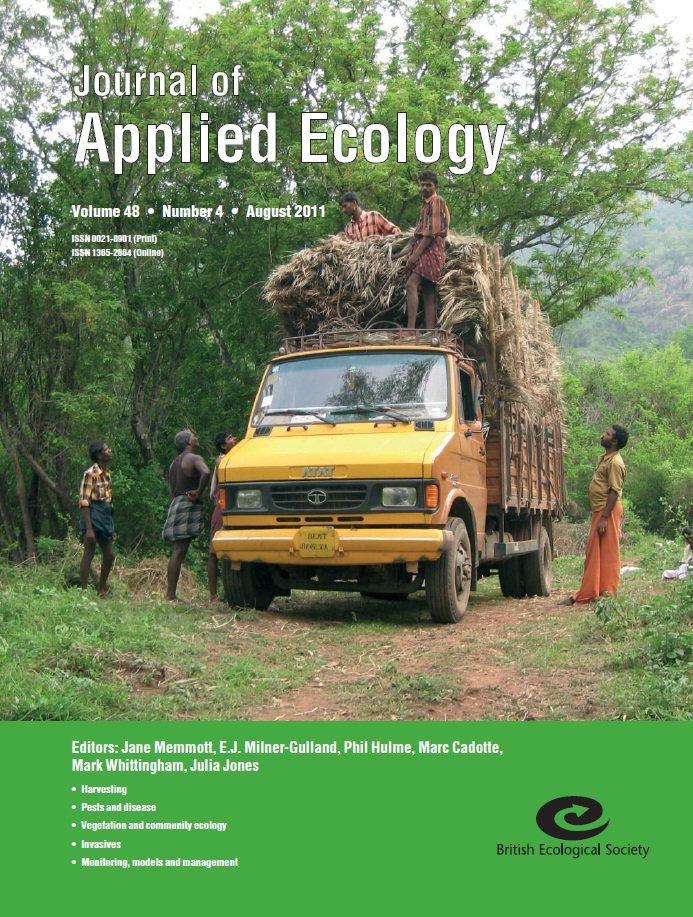*Click here for my Google Scholar profile*
If you do not have institutional or personal access to these papers, please feel free to contact me for a copy.
Mandle, L., B.P. Bryant, M. Ruckelshaus, D. Geneletti, J.M. Kiesecker and A. Pfaff. (In press). Entry points for considering ecosystem services within infrastructure planning: How to integrate conservation with development in order to aid them both. Conservation Letters. doi:10.1111/conl.12201
Terrado, M., S. Sabater, B. Chaplin-Kramer, L. Mandle, G. Ziv, V. Acuņa. (2016). Model development for the assessment of terrestrial and aquatic habitat quality in conservation planning. Science of the Total Environment. 540(1):63-70. doi:10.1016/j.scitotenv.2015.03.064
Mandle, L., H. Tallis, L. Sotomayor and A.L. Vogl. (2015). Who loses? Tracking ecosystem service redistribution from road development and mitigation in the Peruvian Amazon. Frontiers in Ecology and the Environment. 13(6):309-315. doi:10.1890/140337
Chaplin-Kramer, R., R.P. Sharp, L. Mandle, S. Sim, J. Johnson, I. Butnar, L. Milā i Canals, B.A. Eichelberger, I. Ramler, C. Mueller, N. McLachlan, A. Yousefi, H. King and P.M. Kareiva. (2015). Spatial patterns of agricultural expansion determine impacts on biodiversity and carbon storage. Proceedings of the National Academy of Sciences. 112(24):7402-7407. doi:10.1073/pnas.1406485112
Mandle, L., T. Ticktin and P.A. Zuidema. (2015). Resilience of palm populations to disturbance is determined by interactive effects of fire, herbivory and harvest. Journal of Ecology. 103(4):1302-1043. doi:10.1111/1365-2745.12420
Mandle, L. and T. Ticktin. (2015). Moderate land use changes plant functional composition without loss of functional diversity in India's Western Ghats. Ecological Applications. 25(6):1711-1724. doi:10.1890/15-0068.1
Varghese, A., T. Ticktin, L. Mandle, S. Nath. (2015). Assessing the effects of multiple stressors on the recruitment of fruit harvested trees in a tropical dry forest, Western Ghats, India. PLoS One. 10(3):e0119634. doi:10.1371/journal.pone.0119634
Mandle, L., T. Ticktin, S. Nath, S. Setty and A. Varghese. (2013). A framework for considering ecological interactions for common non-timber forest product species: a case study of mountain date palm (Phoenix loureiroi Kunth) leaf harvest in South India. Ecological Processes. 21(1):1-9. doi:10.1186/2192-1709-2-21
Mandle, L. and T. Ticktin. (2013). Moderate land use shifts plant diversity from overstory to understory and contributes to biotic homogenization in a seasonally dry tropical ecosystem. Biological Conservation. 158:326-333. doi:10.1016/j.biocon.2012.08.006
Krishnamurthy, V., L. Mandle, T. Ticktin, R. Ganesan, Saneesh C.S. and A. Varghese. (2013). Conservation status and effects of harvest on an endemic multi-purpose cycad, Cycas circinalis L., Western Ghats, India. Tropical Ecology. 54(3):309-320.
Mandle, L. and T.Ticktin. (2012). Interactions among fire, grazing, harvest and abiotic conditions shape palm demographic responses to disturbance. Journal of Ecology 100(4):997-1008. doi:10.1111/j.1365-2745.2012.01982.x
Mandle, L. (2012). Balancing biodiversity and human land use: Effects of fire, grazing and harvest on plant individuals, populations and communities in the Western Ghats, India. Ph.D. Thesis. University of Hawai‘i at Mānoa gradworks.umi.com/35/20/3520689.html
Cover photo in Journal of Applied Ecology:

Schmidt, I.B.*, L. Mandle*, T. Ticktin and O.G. Gaoue. (2011). What do matrix population models reveal about sustainability of non-timber forest product (NTFP) harvest? Journal of Applied Ecology. 48(4):815-826. doi:10.1111/j.1365-2664.2011.01999.x
Mandle, L.*, J. Bufford*, I.B. Schmidt*, and C.C. Daehler. (2011). Woody exotic plant invasions and fire: Reciprocal impacts and consequences for native ecosystems. Biological Invasions. 13(8):1815-1827. doi:10.1007/s10530-011-0001-3
Mandle, L. , D.L. Warren, M.H. Hoffmann, A.T. Peterson and J. Schmitt, E.J. von Wettberg. (2010). Conclusions about niche expansion in introduced Impatiens walleriana populations depend on method of analysis. PLoS One. 5(12): doi:10.1371/journal.pone.0015297
* indicates equal contribution